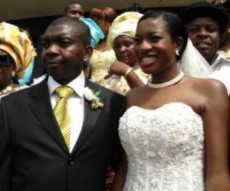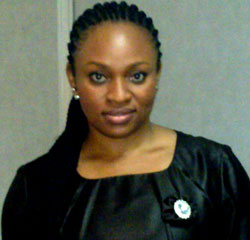
Olanrewaju Dabiri popularly known as eLDee studied Architecture at the University of Lagos, but he never searched for a job with his certificate. Music, which incidentally has made him popular in and outside Nigeria, got the better of him. In this interview with Adunola Fasuyi, he speaks on issues concerning his life, music and many more. Excerpts:
Why didn’t you try to get a job with your architecture degree?
I am not working with my degree because for me, architecture is not what most people think it is. Architecture is not about building houses, architecture is about solving problems. It is about design. It’s about looking at a problem and finding a solution. It’s about creating a design to solve problems, so it doesn’t necessarily have to do with buildings. So, I can tell you that I apply architecture in everything that I do. Architecture is in my blood.
Which problems are you solving in music now?
First of all, we have created a lot of things based on my knowledge of architecture. Everything, from how we started distributing music in Nigeria, to how we started making videos of a certain grade, to how we created a new sound, which was like a match up of different sounds. Architecture kind of shows itself somehow in all of that.
So, you are saying that you have brought improvement to Nigerian music?
I will not call it improvement. I will call it a new idea. We brought a new Idea. We created a different genre of music because my belief is that everybody is a product of his ir her individual experiences, which means that if you grow up in a certain place and you speak a certain language, then your taste will be based on those things you know. For me, the kind of music that we created is a reflection of people of our age in Africa.
Because we have been subjected to a lot of reggae, afro beat, fuji, juju, highlife, country music, and so on, the music that we created is a combination of all those kind of music. It’s a reflection of who we are. We created our own sound. Like I call my kind of music urban African or urban Nigerian music, because it is difficult to put a tag on it, considering the many kinds of music mixed up in it.
Tell us what people don’t know about you?
What people don’t know about me is that I am actually a good guy. Contrary to what most people think, I am very approachable, I am very friendly. I love computers and gadgets. I like having fun time with my family. I love playing with my daughter. I love to watch movies and series when I have time.
Were you into music when you met your wife?
I was just about to start when I met my wife, so she has been through the whole process with me. Professionally, I started making music in 1998 with Tribes Men. I have always had a passion for music. I always had one little instrument or the other, one keyboard or one drum machine when I was growing up but I never pieced my own music together until 1997.
Were happened to Tribes Men?
It was just differences in our personalities that separated us. We were all in it for different reasons and if somehow the reason you are in it was not being fulfilled anymore, then you will want to move away.
I have come to the conclusion that groups will always break up because personalities will always clash, unless there are people that are willing to just sit back and allow other people’s personalities to interfere with their own.
Which of your albums was the most difficult in producing?
If it’s based on just general reasons and not musical reasons, then my last album was most difficult because I made it when I had to have my generator running 24 hours a day. I was getting back into being in Nigeria and dealing with those things.
When you get to a level where you decide to hang your microphone, what other things would you venture into?
I would love to establish an academy that will offer professional courses on every detail in video production. Like when I shot Bosi Gbangba abroad, the experience was different.
There was so much attention to every little detail of making the video. There is a professional assigned to every aspect of the production, not like here where the producer is the director and DOP etc. Over there, there is somebody who handles just the light, that is his focus for that day.
He makes sure that there is no blown out spots, there is another person who makes sure that when the camera moves, the object stays in focus. The person is called the Focus Puller and that is all he does.
When you have these kind of people on ground in a movie shooting, perfection is easy but we cannot do that here because we don’t have schools that train people on those aspects. Even with all these challenges, we are still doing well.
So, I will like to establish a school for that, where people can study these things for years at the level which everybody becomes a professional so that when people are coming to Nigeria to shoot, they don’t have to bring their crew.
What was going on in your mind when you wrote your part in the Jah Bless song ‘Joo’?
I was told that I was going to be on a song with Jah Bless, Durella, RuggedMan, Ice Prince, Reminisce, so I knew I had to sit up. I told myself that I must not sound like a dunce on the song. I loved being part of that song, I love the ridiculous sound of the song. We were just having fun. The comedy part of music has been turned down a little bit in music that is coming out these days. So, I was very excited when I heard about Joo because I used to like making a lot of comical songs too.
Tell us a bit about your background?
We were very comfortable, it’s not about having a hundred million naira. It is all about being contented. I grew up very contented. I had the things that I needed. When I wanted to go into music, I had my parents’ support. They supported me because they didn’t have any choice. The Nigerian parents always have this fear that a child that wants to do music does not want to study. When you discover that the child makes As in his grades, you have no option than to buy him what he wants, the only excuse will be that you don’t have money.
For them, I was lucky enough to be a brilliant child, so I did not have to deal with all that. When you know your son is going to be an architect and he is going to be the best in his class, then if he tells you to buy him a guitar, you won’t think of it as a big deal.
I never got expelled; I never got suspended in school. I never had an extra year. I had distinction in architecture. I got As in all my subjects at the JSSCE level and all As in all my subjects at the SSCE level. So, there was no reason not to let me do music. Moreover, music makes more sense for me than architecture.
Do you believe in appearances?
Yes I do, the way you look, speaks volume of you, even before you speak. I always like to appear simple.
Has simplicity always been your style?
Yes, I love being simple. I was more withdrawn when I was growing up. While people are worried about which Valentino or YSL is in vogue, my head was in one computer somewhere trying to figure out something.
I didn’t grow up being particular about designers. It was when I started coming out on TV and I needed to pay more attention to my appearance that I got interested in all those fashion stuffs. I don’t look at the designers name. I just buy quality stuffs not because it has a particular name.
Do you get advances from women?
Yes. I do
How do you manage it?
We manage it any how.
Is it that you get down with them or what?
Not getting down with them. I just try to be nice.
How come you don’t wear your wedding ring?
I just don’t. My excuse is going to sound ridiculous, so, I won’t even say it. All I can tell you is that it is my wife that removed it. She told me don’t worry, take it off.
You are easily spotted in check shirts, is that your style?
Check shirts is not my style. I only have about two or three check shirts. My style is casual. I like simple and smart casual.
What about the lines you carve in your hair?
That is my brand logo. A barber did that in London and I liked it. Working with my brand people, we needed something to give me a distinguished face because I have a common face, so I retained the hairstyle. I have had it for two years now.
How large is your wardrobe?
If it is by volume of clothes, clothes come in and out. I don’t know how to hold onto clothes for a very long time. I have lost count of my shoes, not that I have thousands but because I recycle my wardrobe once in a while. I give them out.
How do you dispose them?
I give them out to charity, orphanages, sometimes local government people, sometimes okada riders in Magodo.
That can be called philanthrophy?
I don’t like to see myself as that. I see myself as a practical person, who understands that what you don’t need anymore, some other people need it.



















